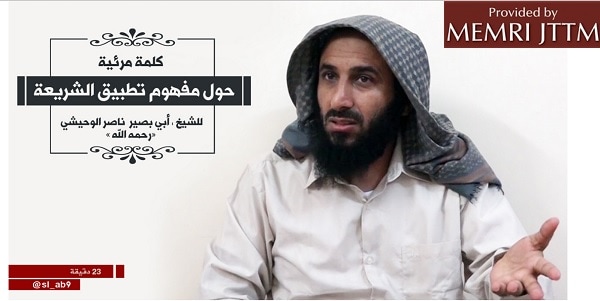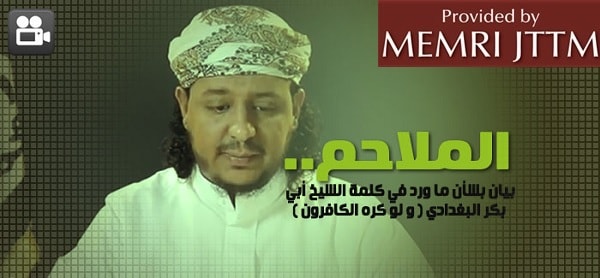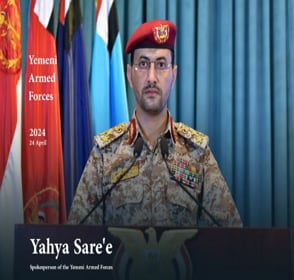By: Mansour Al-Hadj*
The following report is a complimentary offering from MEMRI's Jihad and Terrorism Threat Monitor (JTTM). For JTTM subscription information, click here.
Introduction
In June 2014, the Islamic State (ISIS) announced the establishment of the Caliphate and called on all jihadi groups to swear fealty to the self-proclaimed caliph, Abu Bakr Al-Baghdadi. Like most of Al-Qaeda's affiliates, Al-Qaeda in the Arabian Peninsula (AQAP) rejected ISIS's call, and instead renewed its fealty to Al-Qaeda commander Ayman Al-Zawahiri. Subsequently, in November 2014, ISIS announced its expansion to many countries, including Yemen, where it has created at least five so-called provinces in San'a, Shabwa, Hadhramout, Lahj and Aden/Abyan. As ISIS's presence in Yemen grows, as manifested by its well-organized military and media operations, AQAP has shown political maturity by carefully distancing itself from ISIS and its practices. This policy is clearly reflected in its new approach to governing and its flexibility regarding the implementation of shari'a laws and punishments.[1] This analysis highlights AQAP's new governing model, which is based on a new approach to implementing the shari'a, as gained from its previous experience; with this, it aims to counter ISIS, whose reputation is overwhelmingly negative.

AQAP Adopts New Approach To Implementation Of Shari'a Law
One of the first, and major, expressions of AQAP's shifting approach regarding the implementation of shari'a law was a statement by the group's late commander Nasser Al-Wuhaishi. In a video released shortly after his death,[2] Al-Wuhaishi indirectly criticized ISIS's approach of implementing shari'a before meeting the people's daily needs. He said: "Today, many of our brothers think that the implementation of the shari'a is [limited] to erasing [advertising] pictures [displayed] in shopping centers, banning songs, and ordering women to wear a hijab, believing that it is mandatory for them to cover their eyes, as well as [forbidding] some of the vices expressed in the streets. This is what they think is the implementation of the shari'a. Unless they see these vices, some of which are minor sins, changed, they believe that shari'a has not been implemented. This is a narrow understanding of Allah's shari'a."
Responding to ISIS supporters' criticism on social media that AQAP is not implementing the shari'a in Al-Mukalla, which has been under its control since April 2015, Al-Wuhaishi called on them to study the shari'a and to ask the religious scholars questions about it: "Allah did not order you to issue fatwas, ban, criminalize, and kill people just because you have guns and in control of Al-Mukalla," he said, and added: "We say that we are not fully empowered. We would like people to be like Abu Bakr and Omar [the first and second successors of the Prophet Muhammad] but this is impossible. We would like that, but the reality is different. Even among the Prophet's companions themselves, there were [righteous men like] Abu Bakr [on the one hand], and the one who urinated inside the mosque [on the other]."
AQAP has shown more flexibility than ISIS in implementing shari'a laws and punishments. Unlike ISIS, which uses beheading, often displays the body together with its severed head, and also often crucifies dead bodies, AQAP carries out executions by shooting. It also appears to have stopped the use of amputation as punishment; compared with its dozens of amputations in 2011 in Abyan and Shabwa, not a single such punishment has been reported in Al-Mukalla. It has even punished its own fighters for transgressions, something that is not reflected in ISIS media; recently, it publicly executed one of its own men for killing another member.[3] The group has also lifted the ban on selling and chewing Khat, which it had imposed in May 2015. According to social media posts, AQAP is now overseeing the Khat trade in Al-Mukalla and collecting taxes from vendors. On October 9, 2015, Twitter user Hadhrami Hadari tweeted a picture of the religious police with the caption "AQAP patrol supervising Khat business in Al-Mukalla's neighborhoods."[4]
.jpg)
AQAP Incorporates Locals Into City Governance Bodies
Responding to criticism by locals in Al-Mukullah, AQAP has demonstrated political maturity by incorporating local leaders and prominent figures in the governance of the city. Additionally, it did not declare Al-Mukalla an "Islamic Emirate" – although it had done so in Abyan and Shabwa when it took them in 2011. In fact, it did not even declare that it had seized the city. Instead, in Al-Mukullah AQAP partnered with the local leaders and tribes to form the Hadhramout National Council, to run government institutions and provide services to residents.
.jpg)
In his first interview following the AQAP takeover of Al-Mukalla, senior AQAP official Khaled Batarfi was asked if handing the city's governance over to a council reflected a development in his group's political vision. Though he denied any such development, he acknowledged that circumstances had been different in 2011. Asked whether the city's residents would have been be intimidated had AQAP declared the city an Islamic Emirate and implemented shari'a punishments there, Batarfi said no, and added that shari'a means not only punishments but also obligations for securing roads, fighting aggressors, preaching, and providing food and services, in addition to implementing the concept of Shura, i.e. Islamic political participation, and power sharing.
AQAP has also expressed political maturity by responding to criticism regarding some of its practices which have been publicly condemned, such as the demolition of the historic Jacob Sufi shrine in Al-Mukalla in October 2015.[5] Although AQAP's views are identical to ISIS's, it handles them differently; for example, when the people of Al-Mukalla protested against the group's mismanagement of the city's resources and against its destruction of shrines and historical sites there, Batarfi acknowledged that his group had made mistakes.[6] Addressing worshipers in a Friday sermon, he explained that AQAP had presented its religious decree ordering the destruction of the shrines, announced it to the public in the city's mosques, and consulted with the city's leaders and obtained their approval for carrying it out.[7] To further highlight his group's position regarding people's concerns, Batarfi noted that one family, whose home was damaged as the result of the demolition of the shrines, had been transferred to another location until AQAP could complete the repairs to it. Indirectly addressing the arrest of two journalists who had been involved in organizing the protest against AQAP, Batarfi urged reporters and writers to act professionally, and to refrain from reporting lies and rumors about the mujahideen. AQAP welcomes constructive criticism, he said, adding, "but we are against inciting strife and criticism which aim to destroy and corrupt."
AQAP has also changed its own name at least twice, to avoid any negative connotations associated with the Al-Qaeda name. Prior to events of the Arab Spring in 2011, it called itself Ansar Al-Sharia; after it took over Al-Mukullah, it began referring to itself as "the Sons of Hadhramout."
AQAP Distances Itself From ISIS, And Steps Up Its Criticism Of It
Aiming to counter ISIS's growing presence in Yemen, as reflected in ISIS's operations – the deadliest of which so far, against the government and the Saudi-led coalition forces, left dozens dead, among them Emirati troops[8] – AQAP has distanced itself from ISIS by refuting its legitimacy, criticizing its attitude towards other groups, and condemning its practices. When ISIS announced the Caliphate and called on all jihadi groups to join it, AQAP rejected the call, and stated that it remained loyal to Al-Qaeda and its leader Ayman Al-Zawahiri.

AQAP's first public response to ISIS, in November 2014, was a video statement by Hareth Al-Nazari, released posthumously, in which he set out AQAP's position of remaining uninvolved in the dispute and rift among jihadi groups in Syria and Iraq. In his response, titled "Even If the Infidels Detest It," to a speech by Al-Baghdadi,[9] Al-Nazari clearly stated that AQAP had decided not to respond to ISIS's accusations against Al-Qaeda. However, he said, AQAP criticized Al-Baghdadi for declaring that all jihadi groups were now dismantled and for insinuating that AQAP was unable to confront the Houthis, as well as for hinting that the group's fighters were not "true believers." Calling ISIS "brothers," Al-Nazari refuted the legitimacy of the declared Caliphate, stating that it did not meet all the required conditions for a caliphate. Furthermore, he noted that Al-Baghdadi had been appointed caliph without consultation of authoritative Muslim figures, as required, and that ISIS's authority does not extend beyond the borders of Syria and Iraq.

To further emphasize that AQAP's priorities differ from those of ISIS, and that it is using different tools to restore the Caliphate, AQAP commanders have repeatedly stressed that their primary enemy is the U.S. For example, senior AQAP commander Sheikh Nasr bin 'Ali Al-Ansi, who was killed in a drone strike in May 2015, had noted that while Al-Qaeda, like ISIS, aspires to establish a caliphate, it advocates doing so by a completely different path: "The project set out for everyone [in Al-Qaeda] is restoring the Islamic caliphate, [but] the course of action [set out for] the mujahideen on the ground, their program and their methods, are different [from those of ISIS]... The essence of [Al-Qaeda's] project is preaching monotheism, the sovereignty of the shari'a, and adherence to the shari'a. [But Al-Qaeda focuses on] directing the Ummah's power and abilities towards uniting and confronting the heart of global heresy – represented by America – and avoids as far as possible diffusing [its efforts] among other projects."
Al-Ansi added: "Why close our eyes and delude ourselves that America is a 'distant enemy,' when in practice it is the one leading the war against us?! If, by eliminating one enemy, you can also eliminate others, you must obviously begin with that enemy... If America falls and is powers diminish to the point where it can no longer interfere in the affairs of the Islamic Ummah, this will help to uproot the apostate apparatuses [i.e., the Arab regimes]... That has been Al-Qaeda's well-known project for two decades. It is the project of Sheikh Osama bin Laden, may Allah have mercy upon his soul, and of Dr. Ayman [Al-Zawahiri], may Allah preserve him. [The latter] follows the path set out by [bin Laden]: the path of restoring the caliphate in the manner of the Prophet, while consulting with the Ummah, involving it and receiving its blessing..."
.jpg)
In October 2015, AQAP criticized ISIS for bombing mosques and public places. In a video statement delivered by Khaled Batrafi, after ISIS carried out a series of deadly suicide attacks inside mosques in Yemen and other countries, he reiterated that AQAP does not approve of, participate in, call for, or support these attacks:[10] "We condemn them and disassociate ourselves from them. This is not our way of jihad and this is not our methodology."
Also in this video, Batarfi presented statements by senior Al-Qaeda leaders, including Osama bin Laden, Ayman Al-Zawahiri, and Abu Yahya Al-Libi, underlining the group's clear and longstanding position against bombing mosques. Criticizing ISIS's insistence on targeting mosques, he noted that AQAP's late leader Al-Wuhaishi had reached out to them, condemning these attacks and warning them not to commit these major crimes. He also noted that AQAP had sent scholars and preachers to ISIS to warn them not to target mosques, but that ISIS had refused to heed them and insisted on continuing to do so.

AQAP's criticism of ISIS has recently grown even harsher. On November 2, 2015, AQAP issued a joint statement with Al-Qaeda in the Islamic Maghreb (AQIM), reiterating both groups' rejection of the Caliphate, accusing ISIS, which it called "Al-Baghdadi's group," of ignoring the Palestinian issue, and criticizing its position regarding other jihadi groups.[11] The statement contrasted ISIS's conduct with Al-Qaeda's own methodology: "This is indeed not the methodology of the mujahideen. This is not Al-Qaeda's methodology, which has stood upon the principles of Islam, defending its sanctities and the oppressed Muslims all over the world..." It also contrasted Al-Qaeda with ISIS by saying: "We seek to cooperate with, assist, and advise every truthful Islamic group, among the jihadi and non-jihadi groups. We are merely a group of Muslims, we do not claim – as Al-Baghdadi and his followers do – to be the group of Muslims... We are a group of construction, cooperation and solidarity. Our path is the path of waging jihad against the enemies of the Ummah and preaching not only to the Muslim masses but to all mankind. The well-being and interest of the Ummah is our interest. The concerns and priorities of the Ummah are our concerns..."
The statement concluded with an appeal to ISIS members, especially those who came from abroad to join it, to recognize its deviance, repent, and leave it: "You have set out for the sake of Allah and to give victory to the religion of Allah. Some of you migrated from distant lands. Is it right then to ruin this [pure] resolution and intention by pronouncing takfir and shedding the blood of Muslims?!"
ISIS Attacks AQAP, Calls On Its Members to Defect
Shortly after the publication of the November 2 AQAP-AQIM statement, ISIS released several videos attacking AQAP for handing over the city of Al-Mukalla to the Hadhramout Council, accusing it of cooperating with the Sahawat militias, and condemning its reluctance to target Houthi mosques.[12] In these videos, ISIS members, some from Yemen, lashed out at AQAP and its leaders, whom they accused of deviating from the path of shari'a and jihad by accepting Taliban leader Mullah Akhtar Mansour as Emir.
Conclusion
Unless major developments unfold, it is highly likely that AQAP, with its current policy of refusing to cooperate with or confront ISIS in Yemen, will continue to remain focused on appealing to people by expressing flexibility and political maturity, in order to present itself as an acceptable alternative to ISIS.
*Mansour Al-Hadj is the director of the MEMRI Reform Project
[1] See MEMRI JTTM report Changing Dynamics In The Global Jihad Movement (2): Jihadis In Yemen Torn Over ISIS, December 29, 2014.
[2] See MEMRI JTTM report AQAP Confirms Death Of Al-Wuhaishi, Announces Appointment Of Al-Rimi As His Successor, June 16, 2015.
[3] twitter.com/ALI_BAJ, October 27, 2015.
[4] twitter.com/ha_Haddra, October 09, 2015
[5] yemenmonitor.com, October 2, 2015.
[6] mukallatoday.com, October 12, 2015.
[7] See MEMRI JTTM report AQAP Commander Defends Destruction Of Historical Sites In Yemen, Vows To Punish Critics, October 20, 2015.
[8] See MEMRI JTTM report ISIS In Yemen Claims Responsibility For Four Suicide Attacks On Government Building, Gulf Military Officers, October 06, 2015.
[9] See MEMRI JTTM report Islamic State Caliph Abu Bakr Al-Baghdadi Says 'The March Of The Mujahideen Will Continue Until They Reach Rome'; Welcomes Pledges Of Allegiance From Saudi Arabia, Yemen, North Africa, Announces New Provinces And Governors There, November 13, 2014.
[10] See MEMRI JTTM report AQAP Criticizes ISIS Bombing Of Mosques In Yemen, October 1, 2015.
[11] See MEMRI JTTM report AQIM, AQAP Denounce ISIS In Joint Statement, November 2, 2015.
[12] See MEMRI JTTM report In New Video, ISIS Attacks AQAP, Calls On Its Members And On Yemen's Sunnis To Join The Caliphate, November 17, 2015.





